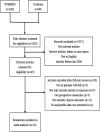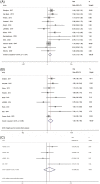Anxiety and prognosis of patients with myocardial infarction: A meta-analysis
- PMID: 33960435
- PMCID: PMC8207975
- DOI: 10.1002/clc.23605
Anxiety and prognosis of patients with myocardial infarction: A meta-analysis
Abstract
Although anxiety is highly prevalent after myocardial infarction (MI), but the association between anxiety and MI is not well established. This study aimed to provide an updated and comprehensive evaluation of the association between anxiety and short-term and long-term prognoses in patients with MI. Anxiety is associated with poor short-term and long-term prognoses in patients with MI. We performed a systematic search in the PubMed and Cochrane databases (January 2000-October 2020). The study endpoints were complications, all-cause mortality, cardiac mortality, and/or major adverse cardiac events (MACEs). Pooled data were synthesized using Stata SE12.0 and expressed as risk ratios (RRs) and 95% confidence intervals (CIs). We included 9373 patients with MI from 16 published studies. Pooled analyses indicated a correlation between high anxiety and poor clinical outcomes (RR: 1.19, 95% CI: 1.13-1.26, p < .001), poor short-term complications (RR: 1.23, 95% CI: 1.09-1.38, p = .001), and poor long-term prognosis (RR: 1.27, 95% CI: 1.13-1.44, p < .001). Anxiety was also specifically associated with long-term mortality (RR: 1.16, 95% CI: 1.01-1.33, p = .033) and long-term MACEs (RR: 1.54, 95% CI: 1.26-1.90, p < .001). This study provided strong evidence that increased anxiety was associated with poor prognosis in patients with MI. Further analysis revealed that MI patients with anxiety had a 23% increased risk of short-term complications and a 27% increased risk of adverse long-term prognosis compared to those without anxiety.
Keywords: anxiety; meta-analysis; myocardial infarction; prognosis.
© 2021 The Authors. Clinical Cardiology published by Wiley Periodicals LLC.
Conflict of interest statement
The author declare no potential conflict of interest.
Figures




Similar articles
-
Physiologically increased total bilirubin is associated with reduced risk of first myocardial infarction: A meta-analysis and dose-response analysis.Nutr Metab Cardiovasc Dis. 2021 Apr 9;31(4):1016-1026. doi: 10.1016/j.numecd.2021.01.002. Epub 2021 Jan 12. Nutr Metab Cardiovasc Dis. 2021. PMID: 33612380
-
Prognostic association of anxiety post myocardial infarction with mortality and new cardiac events: a meta-analysis.Psychosom Med. 2010 Jul;72(6):563-9. doi: 10.1097/PSY.0b013e3181dbff97. Epub 2010 Apr 21. Psychosom Med. 2010. PMID: 20410247
-
The association between periodontal disease and the risk of myocardial infarction: a pooled analysis of observational studies.BMC Cardiovasc Disord. 2017 Feb 1;17(1):50. doi: 10.1186/s12872-017-0480-y. BMC Cardiovasc Disord. 2017. PMID: 28143450 Free PMC article. Review.
-
The association between soluble suppression of tumorigenicity-2 and long-term prognosis in patients with coronary artery disease: A meta-analysis.PLoS One. 2020 Sep 4;15(9):e0238775. doi: 10.1371/journal.pone.0238775. eCollection 2020. PLoS One. 2020. PMID: 32886697 Free PMC article.
-
Long-Term Effect of β-Blocker Use on Clinical Outcomes in Postmyocardial Infarction Patients: A Systematic Review and Meta-Analysis.Front Cardiovasc Med. 2022 Apr 8;9:779462. doi: 10.3389/fcvm.2022.779462. eCollection 2022. Front Cardiovasc Med. 2022. PMID: 35463744 Free PMC article.
Cited by
-
Cerebral derailment after myocardial infarct: mechanisms and effects of the signaling from the ischemic heart to brain.J Mol Med (Berl). 2022 Jan;100(1):23-41. doi: 10.1007/s00109-021-02154-3. Epub 2021 Oct 21. J Mol Med (Berl). 2022. PMID: 34674004 Free PMC article. Review.
-
Psychological Risk Factors in Cardiac Rehabilitation: ANXIETY, DEPRESSION, SOCIAL ISOLATION, AND ANGER/HOSTILITY.J Cardiopulm Rehabil Prev. 2023 Nov 1;43(6):E20-E21. doi: 10.1097/HCR.0000000000000828. Epub 2023 Sep 20. J Cardiopulm Rehabil Prev. 2023. PMID: 37729630 Free PMC article.
-
Psychological impact of first admission with cardiovascular disease in a tertiary hospital in Oman.J Taibah Univ Med Sci. 2023 Sep 9;19(1):28-34. doi: 10.1016/j.jtumed.2023.08.008. eCollection 2024 Feb. J Taibah Univ Med Sci. 2023. PMID: 37868102 Free PMC article.
-
Prevalence of Depression, Anxiety and Post-Traumatic Stress Disorder (PTSD) After Acute Myocardial Infarction: A Systematic Review and Meta-Analysis.J Clin Med. 2025 Mar 7;14(6):1786. doi: 10.3390/jcm14061786. J Clin Med. 2025. PMID: 40142595 Free PMC article. Review.
-
Peer-support interventions and related outcomes in patients with myocardial infarction: A systematic review.Heliyon. 2024 Jan 26;10(3):e25314. doi: 10.1016/j.heliyon.2024.e25314. eCollection 2024 Feb 15. Heliyon. 2024. PMID: 38327461 Free PMC article.
References
-
- Reed GW, Rossi JE, Cannon CP. Acute myocardial infarction. Lancet. 2017;389:197‐210. - PubMed
-
- Rentrop KP, Feit F. Reperfusion therapy for acute myocardial infarction:concepts and controversies from inception to acceptance. Am Heart J. 2015;170:971‐980. - PubMed
-
- Donges K, Schiele R, Gitt A, et al. Incidence, determinants, and clinical course of reinfarction in‐hospital after index acute myocardial infarction (results from the pooled data of the maximal individual therapy in acute myocardial infarction [MITRA], and the myocardial infarction registry [MIR]). Am J Cardiol. 2001;87(9):1039‐1044. - PubMed
Publication types
MeSH terms
LinkOut - more resources
Full Text Sources
Other Literature Sources
Medical

